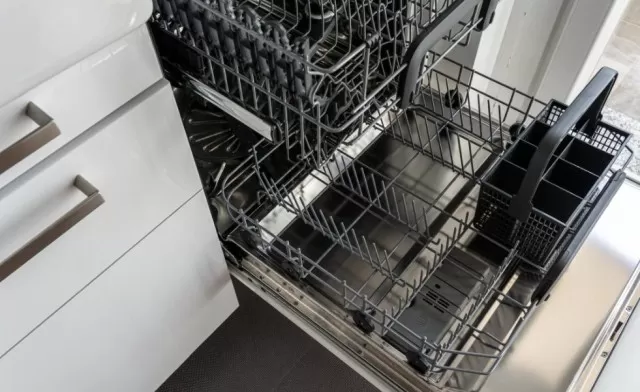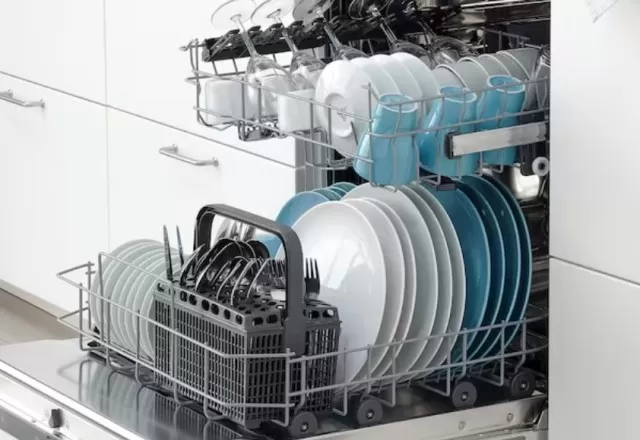Dishwashers are known for their time-saving convenience, but they can also become a source of unpleasant odors if not properly cared for.
These foul smells can make your kitchen, especially the eat-in area, an unappealing space.
From food residue clogging the drain to accumulated unwashed dishes and stagnant water, there are several reasons why a dishwasher may develop stronger-than-usual odors. To ensure your kitchen maintains a fresh scent, cleaning experts emphasize the need to pay attention to these three primary sources of dishwasher stenches.
Common Causes of Unpleasant Odors in Dishwashers

Several factors can contribute to the development of odors in dishwashers over time.
One of the main culprits is the accumulation of food residue and debris in the dishwasher’s filter and spray arms. If the dishwasher is not used regularly and dirty plates and dishes are left to pile up, the food can begin to degrade inside the dishwasher before running a cleaning cycle.
To prevent this, it is recommended to hand wash a few dishes at a time rather than letting them accumulate over days.
According to Alicia Sokolowski, President of AspenClean, food debris is a major cause of foul dishwasher smells.
Leftover food particles can rot and create an unpleasant odor if they are not properly removed during the cleaning cycle. To avoid these smells, it is important to pre-rinse dishes before placing them in the dishwasher.
Additionally, after each cycle, running an empty dishwasher with hot water and fresh lemon can help eliminate any remaining odors.
Another common cause of dishwasher odors is standing or hard water.
If the dishwasher drains are clogged or if there is stagnant water in the dishwasher or drain pipes, it can create a breeding ground for bacteria and microorganisms, resulting in foul smells. Duane Miller, CEO of Stellar Plumbing, suggests regularly checking for clogs in the drain and using a dishwasher cleaner specifically designed to remove mineral buildup caused by hard water.
If the problem persists, it may be necessary to address the issue of hard water entering the home.

Improper loading of the dishwasher can also contribute to odors.
It is important to ensure that bulkier items are placed on the bottom rack and tilted to allow for proper runoff. It is also crucial to avoid putting non-cookware items, such as paint bowls, brushes, or other art supplies, in the dishwasher, as they can clog the drains and lead to standing water.
Mold and mildew can thrive in a moist environment, and a moldy or old dishwasher can emit musty or moldy odors.
If the dishwasher is not cleaned or maintained properly, these odors can become noticeable. Regular cleaning of the dishwasher Using Vinegar and water solution or dishwasher cleaner is recommended.
Leaving the dishwasher door open after a cycle to allow for proper drying and checking the manufacturer’s manual for the recommended lifespan of the dishwasher are also important steps to prevent odors. If the dishwasher is old and beyond its effective lifespan, it may be necessary to replace it or consult a plumber to replace worn-out tubes and drains leading to the dishwasher.
Remedies for Dishwashers Odors
Fortunately, most dishwasher odor issues can be resolved through regular cleaning and maintenance.
Removing food debris, checking drainage lines, and keeping the dishwasher dry are essential preventive measures to eliminate bad smells.

Duane Miller suggests regularly cleaning the interior of the dishwasher by wiping it down, cleaning the dishwasher’s filter, and running a dishwasher cleaner through a cycle at least once a month.
Scraping excess food from dishes before loading them into the dishwasher can help prevent food particles from causing odors. Using hot water when running the dishwasher helps dissolve remaining food particles, and using a rinsing solution can prevent mineral buildup and keep the dishwasher smelling fresh.
Alicia Sokolowski recommends two natural solutions for eliminating dishwasher odors.
Regularly cleaning the interior of the dishwasher with a mixture of vinegar and baking soda on a hot water cycle helps remove bacteria and prevent mineral buildup. Running the dishwasher on a hot water cycle with a cup of lemon juice can also break down leftover food and oils that may accumulate in hard-to-reach areas, keeping the dishwasher fresh and odor-free.
*The information is for reference only.